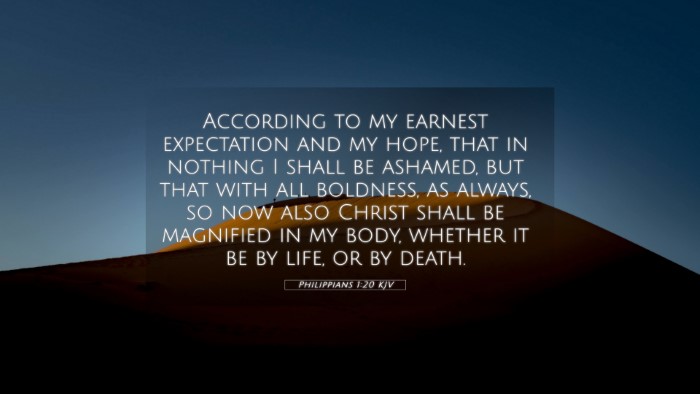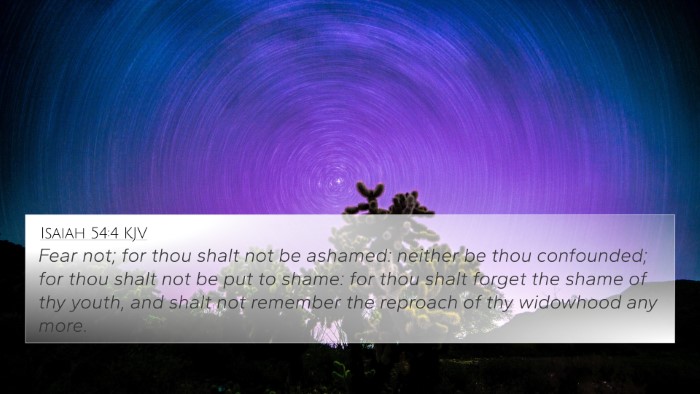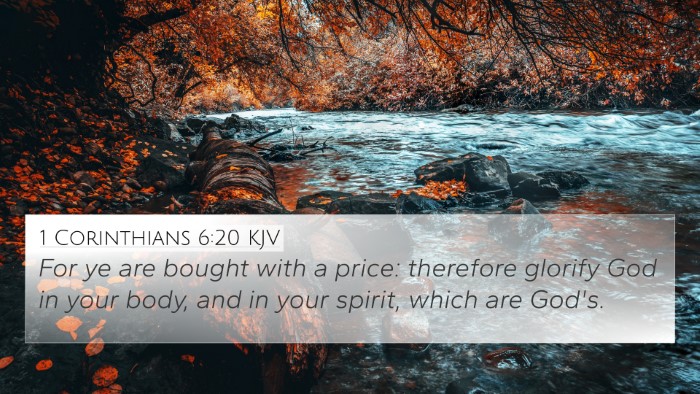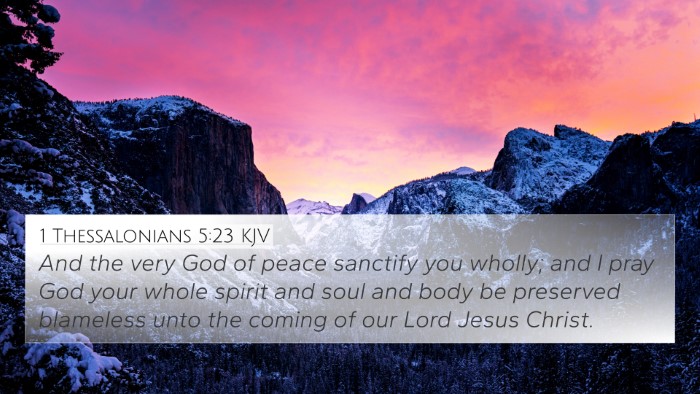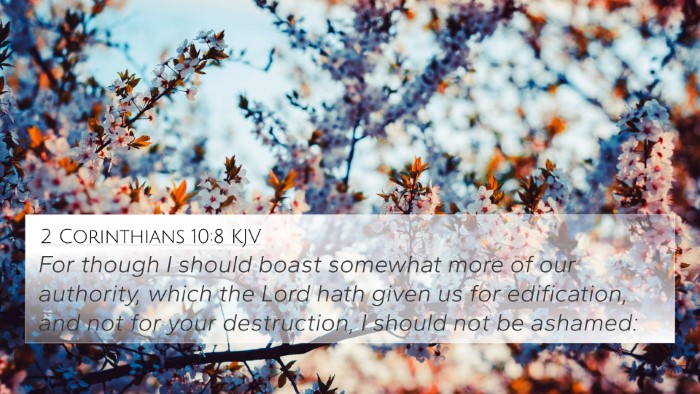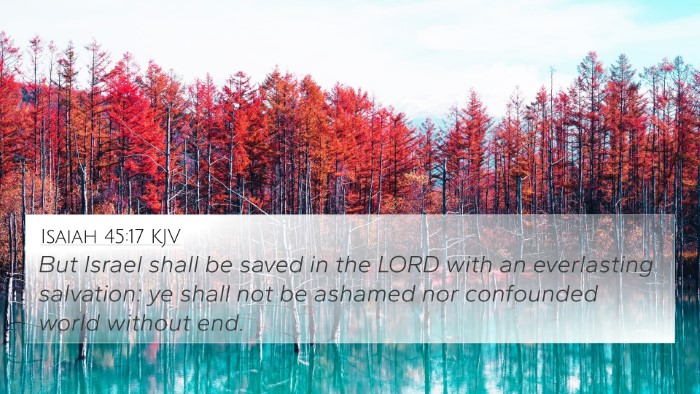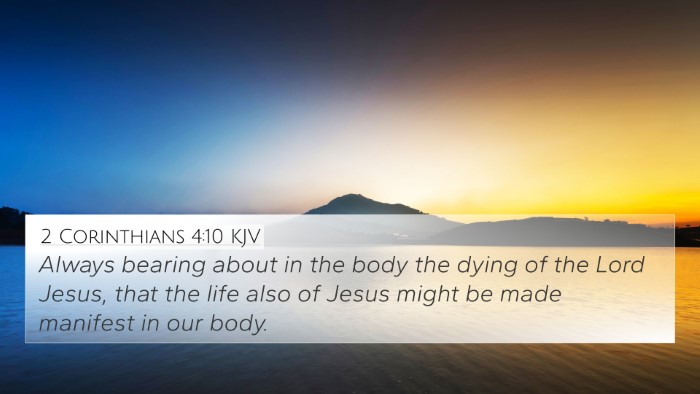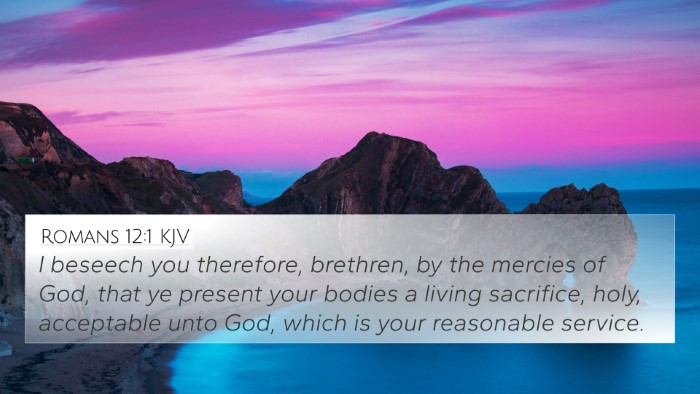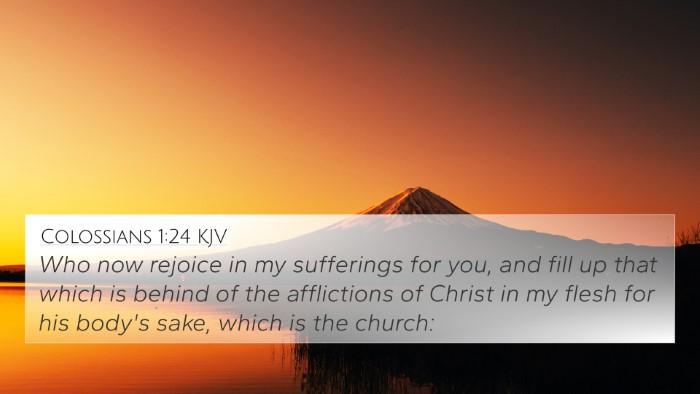Understanding Philippians 1:20
Philippians 1:20 states: "According to my earnest expectation and my hope, that in nothing I shall be ashamed, but that with all boldness, as always, so now also Christ shall be magnified in my body, whether it be by life, or by death." This verse is a powerful declaration of Paul’s faith and determination amidst his imprisonment.
Key Themes in Philippians 1:20
- Expectations and Hope: Paul's expectation is anchored in his relationship with Christ, representing a profound assurance that goes beyond his current circumstances.
- Boldness in Testimony: Paul emphasizes the need for boldness, showcasing that his desire is to honor Christ regardless of the outcome.
- Christ Magnified: The ultimate aim of Paul's life is to glorify Christ, whether through living or dying, underscoring the transformative power of Christ in a believer’s life.
Commentary Insights
Matthew Henry’s Commentary: Henry expounds that Paul's "earnest expectation" highlights a desire for Christ to be exalted. This desire indicates not only personal strength in facing adversity but also reflects a hope that transcends earthly experiences, suggesting believers should strive for a life that glorifies Christ above all.
Albert Barnes’ Notes: Barnes points out that Paul was in a challenging situation but remained resolute in his faith. He asserts that the context of his imprisonment should not diminish the glory of Christ; rather, it should serve as a platform for God’s power to be displayed.
Adam Clarke's Commentary: Clarke emphasizes the dual aspect of Paul’s statements about life and death. He encourages believers to view their existence as an opportunity to magnify Christ, thereby fostering a richer understanding of what it means to live in faith.
Bible Verse Cross-References
To gain a comprehensive understanding of Philippians 1:20, we can reference several related Scriptures:
- John 21:19 - "This spake he, signifying by what death he should glorify God." - This verse connects with Paul's notion of glorifying Christ through death.
- Romans 14:8 - "For whether we live, we live unto the Lord; and whether we die, we die unto the Lord: whether we live therefore, or die, we are the Lord's." - Reflects Paul’s sentiment of belonging to Christ in life and death.
- Galatians 2:20 - "I am crucified with Christ: nevertheless I live; yet not I, but Christ liveth in me." - This parallels the theme of Christ living through believers.
- 2 Corinthians 5:15 - "And that he died for all, that they which live should not henceforth live unto themselves, but unto him." - Reinforces the idea of living for Christ.
- Colossians 1:27 - "Christ in you, the hope of glory." - Connects to the hope Paul expresses in Philippians.
- 2 Timothy 1:12 - "For the which cause I also suffer these things: nevertheless I am not ashamed..." - Paul’s declaration of faith in the face of struggles aligns with this verse.
- 1 Peter 4:16 - "Yet if any man suffer as a Christian, let him not be ashamed; but let him glorify God on this behalf." - Reflects on the honor of suffering for Christ, similar to Paul’s expectation.
Thematic Bible Verse Connections
The verse encapsulates key Christian themes such as:
- Faith in Suffering: Paul's imprisonment exemplifies how faith can be sustained even in trials.
- Hope for Future Glory: Paul's expectation of magnifying Christ points to the ultimate hope of resurrection.
- Living for Christ: The importance of life dedicated to glorifying God is a recurring theme throughout Scripture.
Conclusion
The richness of Philippians 1:20 invites Christians to engage in cross-referencing Biblical texts to deepen their understanding. By linking this verse with others in the New Testament, believers can explore themes and encouragements that support a life dedicated to the glory of Christ. Utilizing tools for Bible cross-referencing, such as a Bible concordance or a cross-reference Bible study guide, can help in identifying these connections.
For anyone studying the Bible, understanding the links between verse to verse provides not only insights but also builds a stronger faith foundation. Engaging in comparative Bible verse analysis can illuminate the shared messages and themes throughout the Scriptures, enriching one's devotional life and understanding of God's overall plan.

